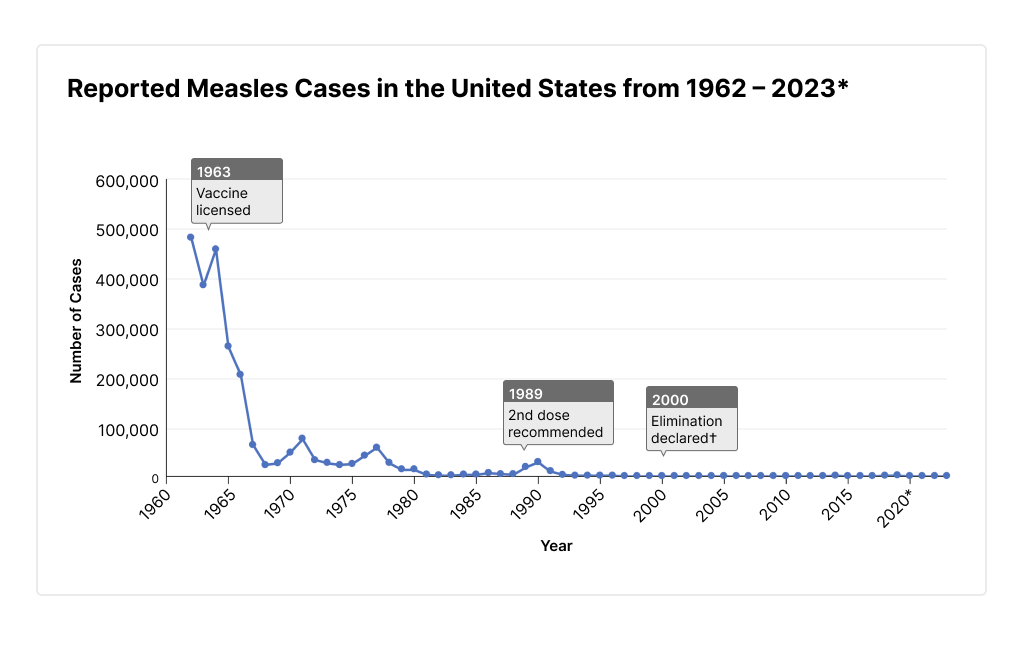What to know

Measles cases in 2024
As of November 7, 2024, a total of 277 measles cases were reported by 32 jurisdictions: Arizona, California, District of Columbia, Florida, Georgia, Idaho, Illinois, Indiana, Louisiana, Maryland, Massachusetts, Michigan, Minnesota, Missouri, New Hampshire, New Jersey, New Mexico, New York City, New York State, North Carolina, Ohio, Oklahoma, Oregon, Pennsylvania, South Carolina, South Dakota, Tennessee, Vermont, Virginia, Washington, Wisconsin, and West Virginia.
There have been 16 outbreaks (defined as 3 or more related cases) reported in 2024, and 71% of cases (196 of 277) are outbreak-associated. For comparison, 4 outbreaks were reported during 2023 and 49% of cases (29 of 59) were outbreak-associated.
U.S. Cases in 2024Total cases |
| Age Under 5 years: 5-19 years: 20+ years: |
| Vaccination Status Unvaccinated or Unknown: One MMR dose: Two MMR doses: |
U.S. Hospitalizations in 2024
|
| Percent of Age Group Hospitalized Under 5 years: 5-19 years: 20+ years: |
What to know about measles
Measles is an airborne, extremely infectious, and potentially severe rash illness. Before the measles vaccine was introduced, an estimated 48,000 people were hospitalized and 400–500 people died in the United States each year.
Measles is not a seasonal virus. However, measles is often spread over times of high travel (like spring break) or in situations where unvaccinated persons are in close quarters (like summer camp).
Did you know that measles can be found around the world? Measles can live in the air for 2 hours after an infectious person leaves the space. Before any international travel, evaluate if your family needs early vaccine doses.
After you return, watch your health for 3 weeks and call your healthcare provider if you or your child gets sick with a rash and fever.
Two doses of MMR vaccine are 97% effective at preventing measles, 1 dose is 93% effective. It is uncommon for someone fully vaccinated to develop measles. However, breakthrough infections (when someone becomes infected after they have been vaccinated) can occur, especially in communities experiencing an outbreak where high levels of measles virus are circulating. The number of breakthrough infections (approximately 5% of total) is consistent with what we have seen in previous years.
Prevent measles and talk to your healthcare provider about the measles, mumps, and rubella (MMR) vaccine, especially if planning to travel.
Measles was declared eliminated in the United States in 2000. This was thanks to a very high percentage of people receiving the safe and effective measles, mumps, and rubella (MMR) vaccine. In recent years, however:
- U.S. MMR coverage among kindergarteners is now below the 95% coverage target—much lower in some communities—and is decreasing.
- Global measles activity is increasing, meaning more chances of an unvaccinated person infected with measles abroad returning to the United States.
CDC is creating models to show how measles outbreaks could occur and spread in the United States. These models can be used to help health departments better identify communities at highest risk and manage healthcare resources.
Weekly measles cases by rash onset date
2023–2024* (as of November 7, 2024)
*2023–2024 case counts are preliminary and subject to change.
Yearly measles cases
as of November 7, 2024
*2023–2024 case counts are preliminary and subject to change.
History of measles cases
Measles was officially eliminated from the United States in 2000, meaning there is no measles spreading within the country and new cases are only found when someone contracts measles abroad and returns to the country. Achieving measles elimination status in the United States was a historic public health achievement. The below figure illustrates how common measles was before vaccines and how vaccine policy enabled elimination.

MMR vaccine coverage for kindergarteners by school year (2009–2024)
The measles, mumps, and rubella (MMR) vaccine is very safe and effective. When more than 95% of people in a community are vaccinated (coverage >95%), most people are protected through community immunity (herd immunity). However, vaccination coverage among U.S. kindergartners has decreased from 95.2% during the 2019–2020 school year to 92.7% in the 2023–2024 school year, leaving approximately 280,000 kindergartners at risk during the 2023–2024 school year. To dive into vaccine coverage data for MMR, visit VaxView.
At local levels, vaccine coverage rates may vary considerably, and pockets of unvaccinated people can exist in states with high vaccination coverage. When measles gets into communities of unvaccinated people in the United States, outbreaks can occur.
Previous years
From January 1 to December 31, 2023, a total of 59 measles cases were reported by 20 jurisdictions: California, Colorado, District of Columbia, Florida, Hawaii, Idaho, Illinois, Kentucky, Maryland, Missouri, New Jersey, New York City, Ohio, Oregon, Pennsylvania, Texas, Utah, Virginia, Washington, and Wisconsin.
*Jurisdictions refer to any of the 50 states, New York City, and the District of Columbia.
From January 1 to December 31, 2022, a total of 121 measles cases were reported by 6 jurisdictions. *
For more information, please see the following report:
- Notes from the Field: Measles Outbreak — Central Ohio, 2022–2023. MMWR. August 4, 2023
*Jurisdictions refer to any of the 50 states, New York City, and the District of Columbia.
From January 1 to December 31, 2021, a total of 49 measles cases were reported by 5 jurisdictions. *
For more information, please see the following report:
- Public Health Actions to Control Measles Among Afghan Evacuees During Operation Allies Welcome — United States, September–November 2021. MMWR. April 29, 2022
*Jurisdictions refer to any of the 50 states, New York City, and the District of Columbia.
From January 1 to December 31, 2020, 13 individual cases of measles were confirmed in 8 jurisdictions.*
*Jurisdictions refer to any of the 50 states, New York City, and the District of Columbia.
From January 1 to December 31, 2019, 1,274 individual cases of measles were confirmed in 31 states.
This is the greatest number of cases reported in the United States since 1992. The majority of cases were among people who were not vaccinated against measles. Measles is more likely to spread and cause outbreaks in U.S. communities where groups of people are unvaccinated.
For more information, please see the following reports:
- Increase in Measles Cases – United States, January 1-April 26, 2019. MMWR. May 3, 2019
- National Update on Measles Cases and Outbreaks – United States, January 1-October 1, 2019. MMWR. October 11, 2019
- National Update on Measles Cases and Outbreaks — United States, January 1–October 1, 2019. MMWR. October 11, 2019
- Notes from the Field: Community Outbreak of Measles — Clark County, Washington, 2018–2019. MMWR. May 17, 2019
- Notes from the Field: Measles Outbreaks from Imported Cases in Orthodox Jewish Communities — New York and New Jersey, 2018–2019. MMWR. May 17, 2019
*Jurisdictions refer to any of the 50 states, New York City, and the District of Columbia.
From January 1 to December 31, 2018, 382 individual cases of measles were confirmed in 28 jurisdictions.*
*Jurisdictions refer to any of the 50 states, New York City, and the District of Columbia.
For more information, please see the following report:
- Measles Outbreak — Minnesota April–May 2017. MMWR. July 14, 2017
*Jurisdictions refer to any of the 50 states, New York City, and the District of Columbia.
For more information please see the following reports:
- Notes from the Field: Measles Outbreak at a United States Immigration and Customs Enforcement Facility — Arizona, May–June 2016. MMWR. May 26, 2017
- Measles Outbreak of Unknown Source — Shelby County, Tennessee, April–May 2016. MMWR. September 30, 2016
*Jurisdictions refer to any of the 50 states, New York City, and the District of Columbia.
For more information please see the following reports:
- Measles — United States, January 4–April 2, 2015. MMWR. April 17, 2015
- Measles Outbreak — California, December 2014–February 2015. MMWR. Feb 20, 2015
*Jurisdictions refer to any of the 50 states, New York City, and the District of Columbia.
For more information please see the following reports:
- Measles Outbreak in an Unvaccinated Family and a Possibly Associated International Traveler — Orange County, Florida, December 2012–January 2013. MMWR. Sep 12, 2014
- Notes from the Field: Measles in a Micronesian Community — King County, Washington, 2014. MMWR. Sep 12, 2014
- Measles — United States, January 1–May 23, 2014. MMWR May 29, 2014
- Notes from the Field: Measles — California, January 1–April 18, 2014. MMWR. Apr 25, 2014
*Jurisdictions refer to any of the 50 states, New York City, and the District of Columbia.
For more information please see the following reports:
- Measles — United States, January 1-August 24, 2013. MMWR. Sep 13, 2013
- Notes from the field: Measles outbreak among members of a religious community — Brooklyn, New York, March–June 2013. MMWR. Vol 62, No 36;752-3 09/13/2013
- Notes from the field: Measles outbreak associated with a traveler returning from India — North Carolina, April–May 2013. MMWR. Vol 62, No 36;753
*Jurisdictions refer to any of the 50 states, New York City, and the District of Columbia.
